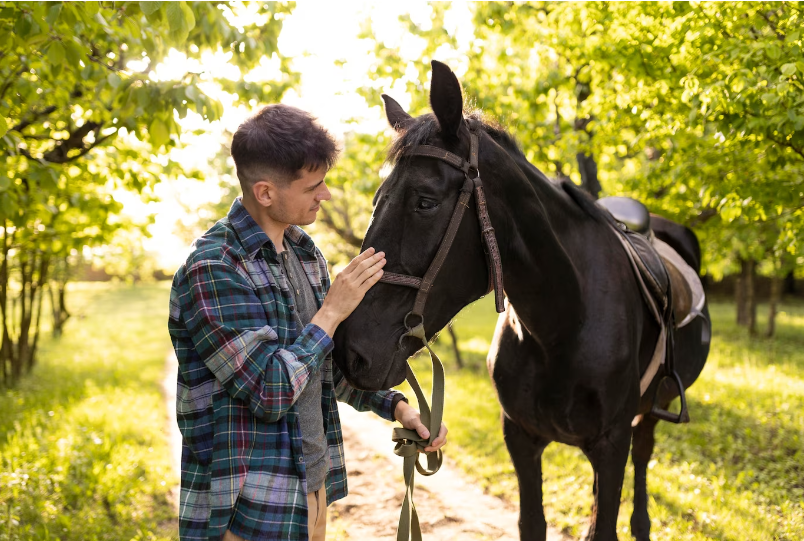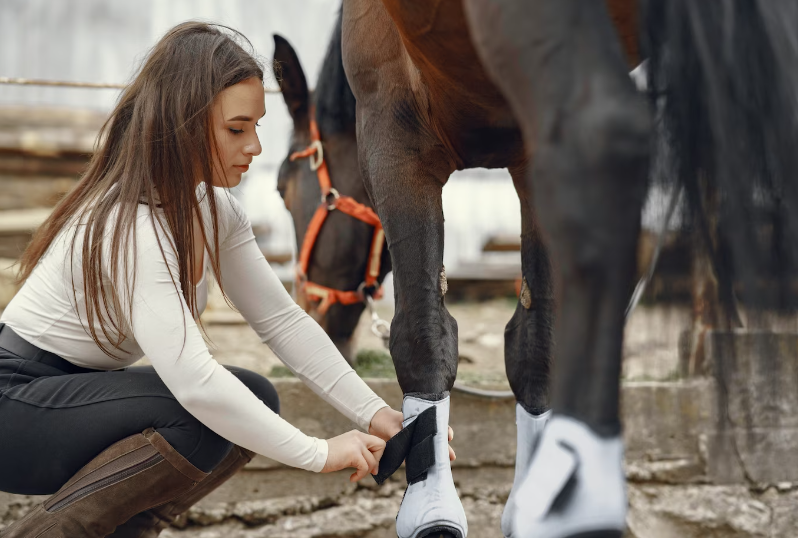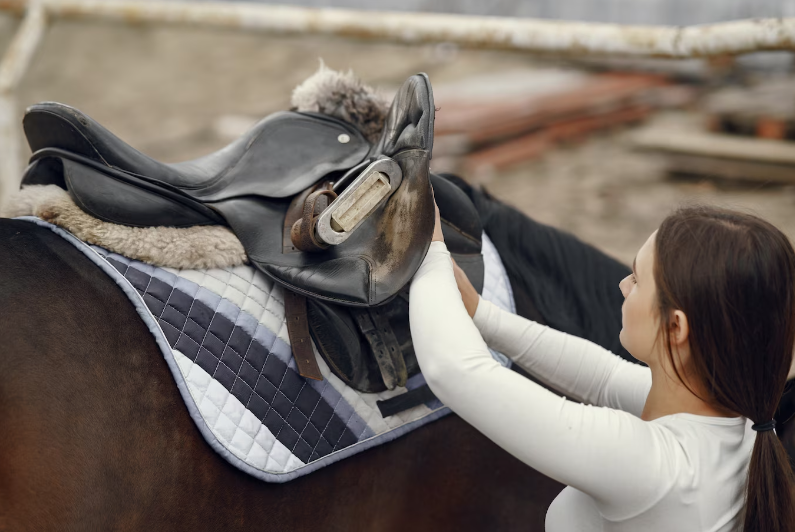Alone but Not Lonely: Ensuring the Wellbeing of Solo Horses
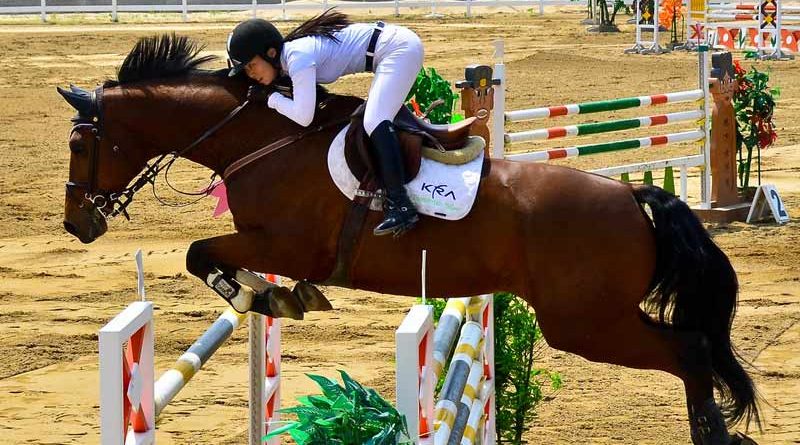
Horses are social animals, and being alone can have a detrimental impact on their well-being. While it is not uncommon for horses to live solo, it’s important for their owners to take proactive steps to prevent loneliness and ensure their horses’ overall health and happiness. In this article, we will explore the various ways in which horse owners can care for their solo horses’ well-being.
Loneliness can lead to a range of negative emotions for horses, including anxiety, depression, and stress. When horses lack companionship, they may exhibit signs of restlessness or behavioral issues such as cribbing or weaving. It is crucial for owners to recognize these signs and take appropriate action to address their horses’ social needs.
One effective way to alleviate loneliness is to provide horses with opportunities for social interaction. This can be done by introducing a companion animal such as a goat or a donkey. While not a replacement for another horse, these animals can provide companionship and help fulfill the horse’s inherent need for socialization.
Additionally, horse owners can consider implementing enrichment activities to keep their solo horses mentally and physically stimulated. This can include providing toys or play structures in the paddock, as well as regularly changing the environment to prevent boredom. By engaging their horses in activities, owners can help reduce feelings of loneliness and promote a healthier, more fulfilled life for their equine companions.
In conclusion, while solo horses may live alone, it is crucial for their owners to recognize the potential negative impact of loneliness on their well-being. By providing social interaction and enrichment activities, horse owners can prevent loneliness and ensure their horses’ long-term happiness. Taking these steps not only benefits the horse, but also strengthens the bond between horse and owner.
Content:
The Importance of Social Interaction
When a horse is left alone for extended periods of time, their wellbeing can be greatly affected. Horses are social animals, and being lonely can lead to stress and other negative emotions. It’s crucial for owners to understand the importance of social interaction for their solo horses.
Lonely horses may exhibit signs of depression or anxiety, such as increased aggression, decreased appetite, or excessive pacing. These behaviors are a cry for companionship and attention. Ensuring that solo horses have regular social interaction can greatly improve their overall wellbeing.
Introducing another horse or providing opportunities for interaction with other horses can go a long way in preventing loneliness. Horses often form strong bonds and enjoy the company of their herd mates. Even brief periods of social interaction can help alleviate feelings of isolation and contribute to a happier and healthier solo horse.
Moreover, social interaction provides mental stimulation for horses. Engaging with other horses helps keep their minds active and prevents boredom. This is particularly important for horses that spend significant amounts of time alone, as they may not have access to the natural mental stimulation that comes from being part of a herd.
Owners can also play an active role in providing social interaction for their solo horses. Spending time grooming, playing, or training with their horse can be valuable bonding experiences. These activities not only provide social interaction but also contribute to the overall wellbeing of both the horse and the owner.
In conclusion, the importance of social interaction for solo horses cannot be overstated. It is essential for their wellbeing and mental health. Whether through introducing another horse or actively engaging with their horse, owners should prioritize ensuring that their solo horses have ample opportunities for social interaction to live happy and fulfilling lives.
Solo Horses and Their Emotional Needs
Horses are social animals that thrive on companionship and interaction with other horses. However, some horses may find themselves alone due to various circumstances, such as the death or removal of a herd member. Ensuring the wellbeing of solo horses is crucial to their overall health and happiness.
When horses are left alone, they can experience feelings of loneliness and isolation, which can have detrimental effects on their mental and emotional state. It is essential for caretakers to understand and address these emotional needs to provide the best possible care for solo horses.
Caring for solo horses involves implementing strategies to mitigate their isolation, such as providing them with the opportunity to interact with other horses, even if only for short periods. This can be done through scheduled turnout with compatible equine companions or by allowing visual and auditory contact with neighboring horses.
Additionally, enriching the solo horse’s environment can help alleviate feelings of loneliness. This can be achieved through the use of toys, mirrors, or even the presence of other companion animals, such as goats or donkeys. These additional stimuli can provide mental stimulation and simulate social interactions, promoting overall wellbeing.
Regular monitoring and observation of solo horses’ behavior is essential to identify any signs of distress or loneliness. Changes in eating habits, increased vocalization, or decreased activity levels may indicate emotional distress. Prompt intervention and appropriate adjustments to their care can help alleviate these issues.
In conclusion, solo horses require specialized care to address their emotional needs and prevent the negative effects of loneliness. By ensuring interaction with other horses, providing environmental enrichment, and monitoring their behavior, caretakers can help promote the wellbeing of solo horses and enhance their overall quality of life.
Cognitive Stimulation for Solo Horses
Ensuring the wellbeing of horses is essential, especially when they are lonely or alone. One important aspect of their care is providing cognitive stimulation. Horses, just like any other living being, need mental stimulation to stay healthy and happy.
Loneliness can lead to boredom and even depression in horses. When left alone for long periods of time, they can become lethargic and lose interest in their surroundings. This is where cognitive stimulation comes in.
There are several ways to provide cognitive stimulation for solo horses:
- Interactive toys: Providing horses with toys that are designed to engage their minds can help prevent boredom. Toys that dispense treats or require problem-solving skills can keep horses entertained and mentally stimulated.
- Training sessions: Regular training sessions not only help horses learn new skills, but they also provide mental stimulation. Teaching horses new commands or tricks can keep their minds active and engaged.
- Enriched environment: Creating an enriched environment for solo horses can stimulate their cognitive abilities. This can include providing them with access to different types of terrain, natural obstacles, or even placing food in different locations to encourage foraging behavior.
- Social interactions: While solo horses may not have the companionship of other horses, they can still benefit from social interactions with humans. Spending quality time with horses, grooming them, or engaging in interactive activities can provide mental stimulation and prevent loneliness.
Cognitive stimulation for solo horses is crucial for their overall wellbeing. By providing interactive toys, regular training sessions, an enriched environment, and social interactions, horse owners can ensure that their solo horses have a mentally stimulating and fulfilling life.
Providing a Suitable Environment
In order to ensure the wellbeing of solo horses and prevent them from feeling alone and lonely, it is essential to provide them with a suitable environment. Horses are social animals and thrive in the presence of their herd. When kept alone, they can experience feelings of isolation and may develop behavioral problems.
When creating the environment for a solo horse, it is important to consider their natural instincts and needs. Providing ample space for exercise and movement is crucial. Horses need to move and roam freely to maintain their physical and mental health.
In addition to space, it is important to provide the horse with visual and auditory stimulation. Placing their paddock or stable near other horses can be beneficial as it allows them to see and hear their companions. This can help alleviate feelings of loneliness and provide a sense of social interaction.
Enrichment activities can also be implemented to keep solo horses mentally engaged. This may include providing them with toys or puzzle feeders that require them to problem solve and keep their minds active. Engaging the horse in training exercises can also provide mental stimulation and help create a bond between the horse and caregiver.
Furthermore, ensuring a clean and comfortable living environment is essential for the wellbeing of the solo horse. Regular cleaning and maintenance of their living space can help prevent the development of health issues and promote their overall happiness.
Overall, providing a suitable environment for solo horses plays a vital role in their wellbeing. By considering their natural instincts, providing ample space for movement, visual and auditory stimulation, enrichment activities, and a clean living space, we can help prevent them from feeling alone and lonely and ensure their overall happiness.
The Role of Regular Exercise
Horses are social animals and being alone for long periods of time can be a source of loneliness and stress. Ensuring that solo horses receive regular exercise is crucial for their overall well-being.
Regular exercise helps to keep horses physically fit and mentally stimulated. It provides them with an outlet for their energy and helps to prevent boredom. Loneliness can lead to behavioral problems such as cribbing and weaving, which can be detrimental to the horse’s health.
Exercise also promotes good circulation, improves muscle tone, and maintains a healthy weight. It helps to keep the horse’s joints flexible and helps prevent conditions such as arthritis. Regular exercise can also improve the horse’s immune system, making them less susceptible to illness.
When exercising solo horses, it is important to vary their routine to keep them engaged. This can include activities such as lunging, riding, or ground training. Providing mental stimulation through obstacles and trail rides can also be beneficial.
It is essential to monitor the horse’s condition during exercise and adjust the intensity and duration accordingly. Over-exercising can cause fatigue and injury, while insufficient exercise can lead to weight gain and muscle stiffness.
In conclusion, regular exercise plays a crucial role in preventing loneliness and promoting the overall well-being of solo horses. It keeps them physically and mentally healthy, prevents behavioral problems, and enhances their overall quality of life.
Ensuring a Healthy Diet
Ensuring proper nutrition is essential for the overall well-being of horses, especially those who are lonely and often left alone. Solo horses can experience increased stress levels, which can have negative effects on their appetite and digestion. Therefore, it is crucial to provide a healthy diet that meets all their nutritional needs.
A well-balanced diet for solo horses should consist of high-quality forage, such as hay or grass, in order to meet their fiber requirements. It is important to provide enough forage to keep them occupied and to simulate natural grazing behaviors. This can help alleviate their boredom and reduce the risk of developing behavioral problems.
In addition to forage, solo horses should also be given access to fresh water at all times. Dehydration can be a serious problem, especially for horses that are alone and may not drink as often as those in group settings. Regularly monitoring their water intake and ensuring a clean supply will help maintain their hydration levels and overall health.
Component Proportion
| Forage | 70-100% of the diet |
| Concentrates (grain, pellets) | 0-30% of the diet (if necessary) |
| Minerals and supplements | As needed, based on individual requirements |
When it comes to concentrates, it is important to consider the individual horse’s needs. Some solo horses may require additional calories or nutrients due to increased stress levels. However, it is crucial to avoid overfeeding concentrates, as this can lead to weight gain and related health issues.
Regularly consulting with a veterinarian or equine nutritionist is recommended to ensure that a solo horse’s diet is optimized for their specific needs. By providing a balanced diet that meets their nutritional requirements, we can help improve the overall well-being of lonely horses and promote their long-term health.
The Benefits of Natural Horsemanship
Ensuring the wellbeing of solo horses is essential to prevent them from feeling lonely and isolated. One approach to caring for solo horses is through natural horsemanship. Natural horsemanship focuses on building a strong bond between horse and handler based on trust and understanding.
Here are some benefits of practicing natural horsemanship:
- Improved Communication: Natural horsemanship techniques promote clear and effective communication between horse and handler. By using non-verbal cues and body language, handlers can establish a mutual understanding with their horse. This helps the horse feel more connected and secure, reducing feelings of loneliness.
- Enhanced Trust: Natural horsemanship emphasizes the development of trust between horse and handler. Through consistent and positive interactions, the horse learns to trust the handler and feels more comfortable in their company. This trust-based relationship can help alleviate loneliness and anxiety felt by solo horses.
- Emotional Wellbeing: Natural horsemanship techniques prioritize the emotional wellbeing of the horse. Handlers focus on creating a stress-free and harmonious environment, meeting the horse’s social and emotional needs. This can contribute to the horse’s overall happiness and reduce the risk of loneliness.
- Physical Exercise: Natural horsemanship involves various activities such as ground work, liberty training, and trail riding. These activities provide physical exercise for the horse, which is essential for their physical health and mental stimulation. Regular exercise can help prevent boredom and loneliness in solo horses.
In conclusion, natural horsemanship can play a crucial role in ensuring the wellbeing of solo horses. By promoting effective communication, trust, emotional wellbeing, and physical exercise, natural horsemanship helps prevent feelings of loneliness and isolation in solo horses.
Creating a Bond Through Groundwork
Loneliness can have a detrimental impact on a horse’s overall wellbeing, especially for solo horses who lack companionship. One way to combat this issue is by creating a strong bond through groundwork.
Groundwork involves working with the horse on the ground, building mutual trust and understanding. This form of interaction allows the horse to develop a sense of companionship with their handler, ensuring their emotional needs are met.
There are various techniques in groundwork that can help in creating a bond with a lonely horse. One such technique is grooming. Spending time gently grooming a horse not only helps to build a connection but also provides them with physical contact, which horses naturally crave.
In addition to grooming, activities such as leading and lunging can also be useful in developing a bond. Leading a horse through various exercises helps to establish trust and cooperation, while lunging provides a form of mental and physical stimulation.
It is important to note that groundwork should be approached with patience and consistency. Building a bond takes time, and it is crucial to respect the horse’s individual needs and comfort levels. By gradually introducing new exercises and challenges, the horse will learn to trust and rely on their handler.
Through consistent groundwork sessions, lonely horses can experience a sense of companionship and fulfillment, promoting their overall wellbeing. The bond created through these interactions can help to alleviate feelings of loneliness and provide comfort to these solo horses.
Benefits of Groundwork for Lonely Horses
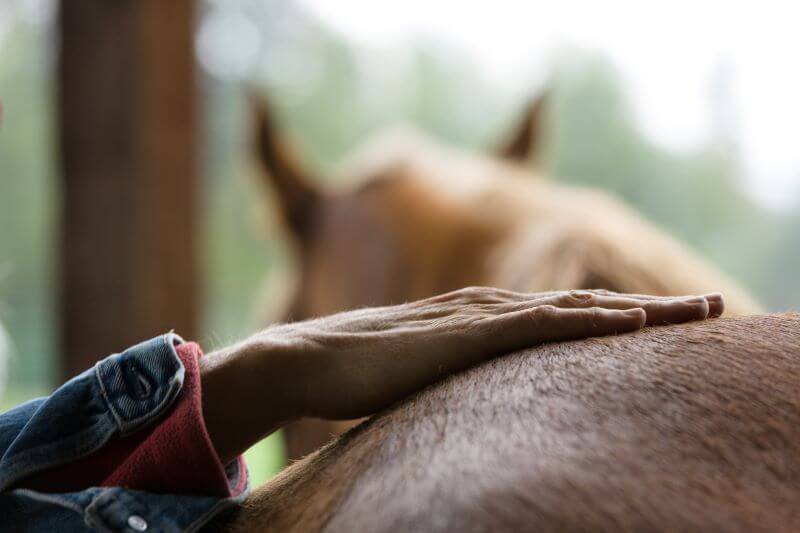
| 1. Builds trust and companionship |
| 2. Provides physical contact and stimulation |
| 3. Alleviates feelings of loneliness |
| 4. Promotes overall wellbeing |
Benefits of Companion Animals
One of the key benefits of companion animals is that they can help alleviate loneliness in solo horses. Being alone for extended periods can lead to stress and anxiety for horses, as they are social animals that thrive on interaction with others. By ensuring that horses have a companion, such as another horse, a donkey, or even a goat, their wellbeing can be greatly improved.
Companion animals provide horses with companionship and social interaction, which are essential for their mental and emotional health. They can engage in mutual grooming, play, and communication, which help to fulfill their need for social interaction. This can help prevent feelings of isolation and loneliness that can often arise when horses are on their own.
In addition to providing companionship, companion animals can also help to stimulate horses’ natural behaviors. For example, horses are herd animals and naturally have a strong bonding instinct. When they have a companion, they can engage in activities such as grazing together, exploring their environment, and engaging in mutual protection.
Companion animals can also act as a source of comfort and security for horses. Horses often take cues from their companions, and having another animal nearby can help to reduce their stress levels and provide a sense of safety and reassurance. This can be especially beneficial for horses that are prone to anxiety or have experienced trauma in the past.
In conclusion, having companion animals is crucial for ensuring the wellbeing of solo horses. They provide companionship, social interaction, stimulation of natural behaviors, and comfort and security. By incorporating companion animals into the lives of solo horses, we can help to prevent loneliness and promote their overall mental and emotional health.
Professional Support for Solo Horse Owners
Solo horse owners often face unique challenges in ensuring the wellbeing of their horses. It can be lonely and overwhelming to care for a horse on your own, but there are professional resources available to provide support and guidance.
One option for solo horse owners is to hire a professional trainer or caretaker to assist them in caring for their horses. These professionals have the knowledge and experience to provide proper care, exercise, and companionship for the horses. They can help ensure that horses are not feeling lonely and are receiving the physical and mental stimulation they need.
Another professional support option for solo horse owners is to join a local horse owner’s association or club. These organizations often offer resources, knowledge-sharing platforms, and networking opportunities for horse owners. By connecting with other horse owners in the community, solo owners can find companionship and support in their journey of caring for their horses.
- Attending workshops, seminars, and training programs specifically designed for solo horse owners is another valuable resource. These events are conducted by equine professionals who can provide guidance on various aspects of horse care, including preventing loneliness and promoting wellbeing. They can also teach owners how to establish a routine and provide mental stimulation for their horses.
- Online communities and forums dedicated to solo horse owners provide a virtual support network. These platforms allow horse owners to connect with others facing similar challenges. They can exchange tips, share experiences, and seek advice for caring for solo horses. This digital support system can be extremely beneficial for solo horse owners who are unable to access physical support networks.
No horse owner should feel alone in their journey of caring for their horse. By seeking professional support and connecting with other horse owners, solo owners can ensure the wellbeing of their horses and alleviate the sense of loneliness often associated with this responsibility.
Identifying Signs of Loneliness
Horses are social animals and thrive on companionship. When left alone for extended periods of time, they can experience feelings of loneliness and can suffer from a decline in their overall wellbeing. It is crucial for horse owners and caretakers to be able to identify signs of loneliness in solo horses.
One of the most evident signs of loneliness in horses is excessive vocalization. Solo horses may whinny and neigh more frequently, as they are trying to communicate and seek the presence of other horses. This constant vocalization can be a clear indication of their longing for social interaction.
Another sign of loneliness in horses is a change in their behavior. Solo horses may become more anxious and restless, constantly pacing or circling their enclosures. They may also exhibit signs of boredom, such as fence-walking or cribbing. These behavioral changes should be taken seriously, as they can indicate a lack of mental stimulation and social interaction.
Physical signs can also manifest in solo horses experiencing loneliness. They may begin to exhibit a decreased appetite, resulting in weight loss or a dull coat. Their overall energy levels may decrease, and they may show signs of lethargy or depression. It is important to monitor their physical health and seek veterinary attention if any of these signs persist.
In conclusion, identifying signs of loneliness in horses is crucial for ensuring their wellbeing. By recognizing the signs of excessive vocalization, changes in behavior, and physical manifestations, horse owners and caretakers can take action to alleviate loneliness and provide the necessary social interaction and mental stimulation for solo horses.
Individualized Care Plans
Loneliness can have a negative impact on the overall wellbeing of horses. Therefore, ensuring their mental and emotional needs are met is essential. One way to do this is by creating individualized care plans for horses that are alone.
These care plans take into account the specific needs and preferences of each horse. For example, some horses may enjoy the company of other animals, such as goats or chickens, while others may prefer more solitary activities and enrichment. By understanding and accommodating these preferences, we can create a care plan that promotes mental stimulation and reduces feelings of loneliness.
In addition to companionship, individualized care plans also address other aspects of a horse’s wellbeing. This can include nutrition, exercise, and veterinary care. By tailoring these aspects to the specific needs of each lonely horse, we can ensure that they are receiving the appropriate levels of care and attention.
Components of Individualized Care Plans
| 1. Companionship: Determine the type and amount of companionship the horse prefers. |
| 2. Enrichment: Provide activities and toys that stimulate the horse’s mind. |
| 3. Nutrition: Evaluate the horse’s dietary needs and adjust accordingly. |
| 4. Exercise: Develop an exercise routine that meets the horse’s physical needs. |
| 5. Veterinary Care: Schedule regular check-ups and vaccinations as needed. |
By following individualized care plans, we can ensure that lonely horses receive the support they need to thrive both physically and mentally. This approach acknowledges the unique requirements of each horse and allows us to provide specialized care that promotes their overall wellbeing.
The Importance of Routine
Establishing a consistent routine is essential for the wellbeing of horses, especially those who live alone. Loneliness can have negative effects on a horse’s mental and physical health, so ensuring a stable routine is a crucial aspect of their care.
Horses are highly social animals who thrive in a herd environment. When horses are kept solo, they may experience feelings of isolation and boredom. This can lead to increased stress, anxiety, and even the development of behavioral issues.
By implementing a structured routine, horse owners can help alleviate these negative effects. A regular schedule provides a sense of security and predictability for the horse, reducing their stress levels and promoting a more stable mental state.
One important aspect of a horse’s routine is their feeding schedule. Horses should be fed at the same times every day, as their digestive system works best when it is accustomed to a consistent routine. This also helps to prevent the horse from becoming anxious or aggressive due to hunger or anticipation of feeding time.
Exercise is another crucial component of a horse’s routine. Regular exercise not only keeps the horse physically fit but also provides mental stimulation and an outlet for their energy. Whether it’s daily turnout in a pasture, ridden work, or engaging in natural horsemanship activities, ensuring the horse receives regular exercise is vital for their overall wellbeing.
In addition to feeding and exercise, maintaining a consistent grooming routine is also important. Regular grooming not only keeps the horse’s coat clean and healthy but also provides an opportunity for bonding and social interaction. Spending time with the horse during grooming sessions can help alleviate their loneliness and provide them with much-needed mental stimulation.
Overall, routine plays a vital role in caring for solo horses’ wellbeing. By establishing a structured schedule that includes regular feeding, exercise, and grooming, horse owners can help prevent loneliness and its negative effects on their equine companions. A consistent routine provides a sense of stability and security, ensuring a happier and healthier life for solo horses.
Question-answer:
Why is loneliness a problem for solo horses?
Loneliness is a problem for solo horses because they are highly social animals that thrive on social interaction. When they are alone for long periods of time, they can become stressed, anxious, and develop behavioral issues.
What are some signs that a horse is lonely?
Some signs that a horse may be lonely include excessive vocalization, pacing, or fence-walking. They may also exhibit changes in appetite or weight loss, as well as engaging in self-destructive behaviors such as cribbing or weaving.
How can owners prevent loneliness in solo horses?
Owners can prevent loneliness in solo horses by providing them with social interaction. This can be done by introducing another compatible horse to their environment, or by arranging regular playdates or outings with other horses. Additionally, providing plenty of mental and physical stimulation through toys, puzzles, or regular exercise can help keep solo horses engaged and content.
Is it possible to keep a horse happy and healthy without companionship?
While it is possible to keep a horse happy and healthy without constant companionship, it is generally not ideal. Horses are herd animals by nature and thrive on social interaction. Providing them with some form of companionship, be it another horse or other animals, is important for their overall well-being and mental health.
What role does environment play in preventing loneliness in solo horses?
The environment plays a crucial role in preventing loneliness in solo horses. A stimulating and enriching environment with plenty of space to move and explore can help mitigate feelings of loneliness. Providing shelter, appropriate pasture, and mental stimulation in the form of toys or interaction with other animals can greatly contribute to a solo horse’s well-being.
Why is preventing loneliness important for solo horses?
Preventing loneliness is important for solo horses because they are herd animals and thrive on social interaction. Loneliness can lead to stress, anxiety, and behavioral issues in horses.
What can happen if a solo horse is left alone for long periods of time?
If a solo horse is left alone for long periods of time, it can develop behavioral issues such as aggression, depression, or destructive behavior. It may also experience heightened stress levels and be more prone to illness or injury.
